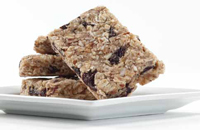Gender-Specific Nutrition
NUTRACEUTICALS
When it comes to overall wellness, men and women, especially as they age, may look for similar nutrients, like vitamins C and E and carotenoids for their antioxidant activity. They may even look for similar nutritional ingredients, but for different reasons, such as omega-3 fatty acids for cardiovascular health or for cognitive health. Where the genders diverge is in their concern for certain health issues. Women, for example, are more concerned with heart health, menopause, bone health, and digestive health whereas men are typically more interested in energy/endurance, lean muscle maintenance, and prostate health. Here is a look at these health concerns and some of the nutritional ingredients believed to play a beneficial role.
Women’s Health Issues
• Heart health. More than one in three women is living with cardiovascular disease, and more women die of heart disease than all forms of cancer combined, according to the American Heart Association. While one in 31 American women dies from breast cancer each year, one in three dies of cardiovascular disease.
Traditional ingredients that are associated with reduced risk of heart disease include soy protein, phytosterols, soluble fiber, and beta-glucans due to their beneficial effects on cholesterol levels. Some dairy proteins are thought to have a helpful effect on blood pressure levels. Omega-3 fatty acids may also play a role in reduced risk of heart disease. Research has pointed to various functions such as stabilizing heart rhythms and heart rates, improving blood lipids and blood flow, and reducing inflammation in blood vessels.
Larsson et al. (2012) suggested that omega-3 long-chain polyunsaturated fatty acids (n-3 LC-PUFAs) may contribute to a modestly lower risk of stroke in women. Data from nearly 35,000 Swedish women aged 49–83 years suggested that consuming n-3 LC-PUFAs was inversely associated with a risk of stroke.
Research has shown that soluble dietary fiber, phytosterols, oat beta-glucan, and barley beta-glucan have cholesterol-lowering effects. A technical session presented at the 2012 IFT Annual Meeting & Food Expo discussed the health benefits of Artinia™ chitin-glucan fiber from Stratum Nutrition, St. Charles, Mo. (phone 636-926-7461, www.stratumnutrition.com). The ingredient is extracted from Aspergillus niger and features the benefits of both soluble and insoluble fibers while supporting clean, healthy arteries and the body’s natural antioxidant systems. Studies show that the consumption of the chitin-glucan fiber supports the body’s natural defenses against oxidized low-density lipoprotein (LDL) cholesterol. Deschamps et al. (2009) showed in a hamster model of nutritionally induced atherosclerosis that regular consumption of chitin-glucan was efficient in preventing the development of atherosclerosis. A pilot study on slightly overweight and hypocholesterolemic human subjects showed that chitinglucan resulted in decreases in blood triglycerides levels and in plasmatic oxidized LDL.
• Pregnancy and menopause. Iron, omega-3 fatty acids, and soy isoflavones are ingredients that can aid women in the uniquely female stages of life, pregnancy, and menopause. Due to menstruation, women’s iron needs are at least twice as high as in men, and giving birth entails even greater stress on the iron economy of women (Fortitech, 2010).
--- PAGE BREAK ---
Important for both the pregnant mother and the fetus, omega-3 fatty acids aid in prenatal brain and eye development. Arachidonic acid and docosahexaenoic acid, in particular, are important to help support the growth of the developing fetus.
The soy isoflavone genistein is believed to aid in menopausal symptoms. A pure form of genistein, geniVida™, from DSM Nutritional Products, Parsippany, N.J. (phone 800-526-0189, www.unlimitednutrition-na.dsm.com), has been shown to help reduce the symptoms of menopause and to help maintain healthy bones. The ingredient is said to offer documented short-term relief (menopause symptom relief including reduction of hot flashes) and long-term benefits (bone health). In a placebo-controlled scientific study, 30 mg of geniVida taken once daily as a single tablet significantly reduced the number and duration of hot flashes in menopausal women.
Helios Corp., Santa Fe, N.M. (phone 505-982-8836, www.helioscorp.net), offers EstroG-100, a self-affirmed GRAS botanical supplement for menopausal women. The ingredient reportedly decreases the severity and frequency of hot flashes and other menopausal symptoms. It is a combination of three botanicals drawn from traditional Korean medicine.
• Bone health. Calcium and vitamin D are vital nutrients for bone development and maintenance, which are important to women of all ages. Calcium, magnesium, and phosphorus play an important role in bone structure and strength.
Bone loss is an important issue, especially in women, whose rate of bone loss accelerates immediately prior to the menopausal period and continues at a rate up to 10 times that of men. The effect is observed in women for approximately 10 years after menopause, when the rate of bone loss then returns to 0.2–0.5% per year, according to information from Ingredion Inc., Westchester, Ill. (phone 708- 551-2600, www.ingredion.com).
There are a number of studies supporting the role of vitamin K-2 in bone health, particularly its ability to optimize the body’s utilization of calcium. Epidemiological studies have linked the consumption of natural menaquinone-7, a form of vitamin K-2, to bone health. The regular consumption of menaquinone-7 may help reduce the risk of age-related decline in bone strength. PL Thomas & Co. Inc., Morristown, N.J. (phone 973-984-0900, www.plthomas.com), offers MenaquinGold ® menaquinone-7, which works harmoniously with other bone-healthy nutrients like calcium, vitamin D, and omega-3 fatty acids.
A seaweed-derived mineral source, Aquamin™, from Ingredion, is rich in calcium, magnesium, and 74 other trace minerals, including zinc, iron, and selenium. It is produced from the red algae Lithothamnion species. O’Gorman et al. (2012) suggested that Aquamin plays an important role in promoting bone formation and may be useful in treating bone diseases such as osteoporosis. The researchers evaluated the effect of Aquamin on osteoblastic behavior and mineralization in a pre-osteoblastic cell line, demonstrating that Aquamin promoted increased mineralization in osteoblast cell culture.
--- PAGE BREAK ---
Prebiotics such as inulin, fructooligosaccharides, and polydextrose are also important in bone health because they have been shown to enhance mineral absorption. For example, NutraFlora® short-chain fructooligosaccharide (scFOS®) from Ingredion has been shown to increase the absorption of minerals through the production of short-chain fatty acids. Minerals must stay in solution in order to be absorbed in the gastrointestinal tract, but they tend to precipitate out of solution at higher pH ranges. The production of short-chain fatty acids lowers luminal pH to an optimal level for keeping minerals in solution longer, thereby enhancing their absorption. NutraFlora is 95% scFOS, and it increases mineral absorption, calcium retention, bone weight, and the level of calcium in the bone.
• Digestive health. Women are more aware of and educated about digestive health and regularity, thanks to the growing promotion of probiotics and prebiotics for use in digestive health. Prebiotics such as fructooligosaccharides, inulin, digestion resistant maltodextrin, and polydextrose aid regularity by helping maintain a balanced gut microflora. And consumers, particularly women, are more familiar with probiotic names like Lactobacillus and Bifidobacteria, and the digestive health benefits of these probiotics.
The spore-forming probiotic, GanedenBC30® (Bacillus coagulans GBI-30, 6086), from Ganeden Biotech Inc., Mayfield Heights, Ohio (phone 866-777-0825, www.ganedenlabs.com), received GRAS status in August 2012. The patented ingredient has been shown to support the immune and digestive systems. The high-survivability probiotic has a naturally occurring layer of organic material that protects the genetic core of the bacteria, enabling it to survive extreme temperatures involved in food and beverage manufacturing processes, shelf life, stomach acids, and intestinal bile.
Men’s Health Issues
• Energy and endurance. B vitamins, D-ribose, and slowly digestible carbohydrates are nutrients that provide energy and endurance for both sports performance and everyday life. Carbohydrates provide a source of energy while D-ribose encourages ATP production and helps maintain optimal levels of cellular energy. B vitamins are popular ingredients for sustained energy and endurance because they are involved in cell metabolism and energy production. B vitamins such as thiamin (vitamin B-1), riboflavin (vitamin B-2), and niacin (vitamin B-3) are critical for operation of metabolic cycles in the body that generate ATP. Other important B vitamins include folate, cobalamin (vitamin B-12), and pyridoxine (vitamin B-6) (Fortitech, 2010).
• Muscle building and recovery. Whey protein has been shown to aid in building and maintaining lean muscle mass, thanks in part to the branch chain amino acids present in whey. One of these amino acids is leucine. Whey protein naturally contains leucine, which plays a significant role in muscle maintenance and repair. The body cannot manufacture leucine so it must be obtained through foods, according to the U.S. Dairy Export Council, Arlington, Va. (phone 703-528-3049, www.innovatewithdairy.com, www.USDEC.org).
A study presented at the American College of Sports Medicine Annual Meeting reaffirmed whey protein’s role in developing lean muscle (USDEC, 2012). The study, which was funded by the Dairy Research Institute and presented by the study’s principal investigator, Jeff Volek, an associate professor at the University of Connecticut, followed participants for nine months as they completed a thrice-weekly resistance training program. They were given either 20 g of whey protein concentrate or soy isolate daily (at breakfast on non-training days or immediately following exercise). “After completing nine months of resistance training, all participants experienced increases in lean muscle mass,” said Volek. “The gains for participants consuming whey protein (3.3 kg) were significantly greater than for participants consuming soy protein (1.8 kg) group, potentially due to the branchedchain amino acid content of the whey protein.” The study builds upon the growing research supporting the value of resistance training combined with whey protein supplementation in building lean muscle.
--- PAGE BREAK ---
Sustamine™, from Kyowa Hakko USA, New York, N.Y. (phone 212-319-5353, www.kyowa-usa.com), a dipeptide of L-alanyl-L-glutamine, is a dietary supplement said to help with rehydration and exercise recovery. It works on multiple levels to help rehydrate the body and sustain energy levels during exertion. The dipeptide structure is quickly and easily absorbed by the body. Harris et al. (2012) showed that blood levels of L-glutamine were higher in healthy human subjects who consumed Sustamine compared to those who consumed L-glutamine.
• Prostate health. Other than skin cancer, prostate cancer is the most common cancer in American men. Prostate cancer is the second-leading cause of cancer death in American men, behind only lung cancer. The American Cancer Society (www.cancer.org) estimates that about 241,740 new cases of prostate cancer will be diagnosed and about 28,170 men will die of prostate cancer in the United States during 2012. About 1 in 6 men will be diagnosed with prostate cancer during his lifetime and about 1 in 36 men will die of prostate cancer.
Lycopene, a red carotenoid found in tomatoes, is said to benefit prostate health due to its antioxidant properties. Most recently, it has been shown to have potential benefits in skin health, protecting against UV skin damage, and in heart health.
Upcoming articles in the next several months will look at more information on some of these issues, including heart health, lean muscle, and skin health.
Linda Milo Ohr,
Contributing Editor,
Denver, Colo.
[email protected]
References
Deschamps, A., Nollevaux, G., Gautier, S., and Keller, F. 2009. Managing oxidative stress with chitin-glucan. AgroFood Industry Hi-tech. 20(4).
Fortitech. 2010. Thrive. Designing health products for women. Technical paper. Sept.
Harris, R.C., Hoffman, J.R., Allsopp, A., and Routledge, N.B.H. 2012. L-glutamine absorption is enhanced after ingestion of L-alanylglutamine compared with the free amino acid or wheat protein. Nutr. Res. 32: 272-277.
Larsson, S.C., Virtamo, J., and Wolk, A. 2012. Dietary fats and dietary cholesterol and risk of stroke in women. Atherosclerosis 221: 282-286.
O’Gorman, D.M., Tierney, C.M., Brennan, O., and O’Brien, F.J. 2012. The marine-derived, multi-mineral formula, Aquamin, enhances mineralisation of osteoblast cells in vitro. Phytother. Res. 26: 375-380.
USDEC. 2012. Study reaffirms whey protein’s valuable role in developing lean muscle. Press release, June 26. U.S. Dairy Export Council, Arlington, Va.


